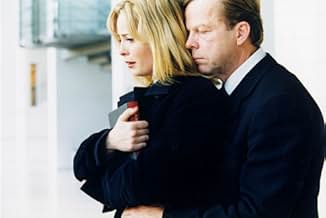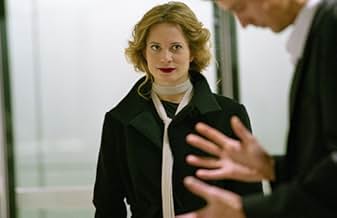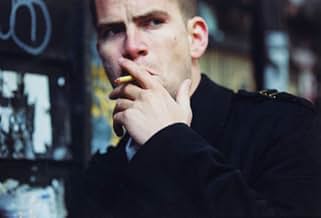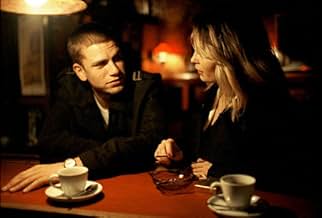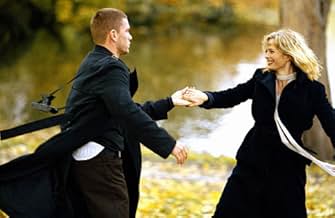IMDb RATING
7.3/10
7.7K
YOUR RATING
A young man who thought himself already in love with a nice girl is drawn into a literary drama when he is captured by a deep and stimulating love affair.A young man who thought himself already in love with a nice girl is drawn into a literary drama when he is captured by a deep and stimulating love affair.A young man who thought himself already in love with a nice girl is drawn into a literary drama when he is captured by a deep and stimulating love affair.
- Director
- Writers
- Stars
- Awards
- 12 wins & 11 nominations total
Carlos Claro Schelin
- Mercedes Sand
- (as Mercedes Claro Schelin)
Line Søndergaard Poulsen
- Girl in metro station
- (uncredited)
- Director
- Writers
- All cast & crew
- Production, box office & more at IMDbPro
Featured reviews
First things first: I find pointless to summarize the plot, therefore I'll stick to my own thoughts about it.
Grainy fade-outs, near-flawless performances, mind-gripping in its non-linear simplicity plot, endless possibilities (if you are prone to indulging in analysis) and a precise, clean-cut overall aspect- are all there, in Boe's beautiful, if slightly formal, first long feature.
This film dodges, quite effortlessly, the one major shortcoming (if you ask me)of Last Year In Marienbad, to which it has been compared; unlike the former, Reconstruction manages, through unmistakably warm-bloodied and wrapped in smoke actors'performances, to surpass the cartoonish, slightly de-humanized concept that pervades Resnais's (i dare utter the word) masterpiece. In other words, the characters are a significant little more than archetypes, they are individuals. Subsequently, the three A's (Alex, Aimee-stunning Marie Bonnevie- and August) stir vaguely-rooted emotions in the spectator, aided by the 3-dimensionality of their acting and enhanced by innumerable, purposeful close-ups and near-perfectly-fitted music.
The intelligent rather than inventive script receives "thumbs up" not for itself but for its glossy, yet not sultry, rendition by often unbearably beautiful shots. Also, the demure approach to sexuality speaks volumes about the power of the camera&actors unity to suggest powerful feelings.
The coherent-enough story (don't let yourselves taken in by deceptive ambiguity) escapes down-and-out moronic de-constructivism for its own sake, allowing thus the average movie-goer to suck the film in, irrespective of his cultural background.
Although data about the characters arrives in dribs and drabs, the film is carefully plotted and succeeds in keeping the spectator's interest up till the end. August, in spite of apparent filmic omnipotence, is bare-handed against the efficiency of tender, scintillating and dizzying love story; the real puppeteer is the director, through his double, the cigarette-levitating, literal charmer, who pulls the strings in this bittersweet faerie. So, once you've learned the ropes of his editing choices and non-linear story ( the 3 possibilities/photos the woman has and other details), which require at least one viewing, Reconstruction becomes more than a feast for the eye. It allows a sensitive insight into a terribly fragile dreamlike world: Orpheus is supposed never to doubt the flesh-and-bone unseen certainty of being followed by Euridice on their way out of the Inferno. The visually enticing, effective portraying of Alex and Aimee's every movement offers precious glimpses of their innermost thoughts.
Speaking flaws, a restraint from taking risks in points of frame composition (aka predictable angles, never going off the beaten track) is quite obvious BUT it actually seems reassuring. Also, the absence of a clear message might affect the appreciation of a part of the public, BUT this is small concern for the director, whose primary aim (stated in August's voice off, in the beginning) is not to convey a moral attitude or a manifesto, but to ease pure delight on the spectators. Nevertheless, the I-cannot-relate-to-it factor breeds suspicion as to the actual relevance of what we see = Why should I care? Meaning, this seemingly inconsequential display of beautiful shots and silences can't extend its influence beyond the immediacy of the 90min viewing. BUT this is highly-debatable, if you take into account different responses from different people.
What I've just said about Reconstruction is hopefully not a gratuitous eulogy, but a considerate comment on what seemed to me a remarkably 'polished' if visually engrossing experience. Throughout the film, one gets the impression of intruding, of being a nosy Parker in an almost perfect, smoothly-trimmed, classy-as-heaven human landscape. Not an emotionless cine-verite, not a sweeping melodrama, not a frowningly guru-ish food-for-thought crap, Reconstitution proves warm enough to be cherished, praiseworthy in terms of cinematography, an outstanding and promising debut.
Grainy fade-outs, near-flawless performances, mind-gripping in its non-linear simplicity plot, endless possibilities (if you are prone to indulging in analysis) and a precise, clean-cut overall aspect- are all there, in Boe's beautiful, if slightly formal, first long feature.
This film dodges, quite effortlessly, the one major shortcoming (if you ask me)of Last Year In Marienbad, to which it has been compared; unlike the former, Reconstruction manages, through unmistakably warm-bloodied and wrapped in smoke actors'performances, to surpass the cartoonish, slightly de-humanized concept that pervades Resnais's (i dare utter the word) masterpiece. In other words, the characters are a significant little more than archetypes, they are individuals. Subsequently, the three A's (Alex, Aimee-stunning Marie Bonnevie- and August) stir vaguely-rooted emotions in the spectator, aided by the 3-dimensionality of their acting and enhanced by innumerable, purposeful close-ups and near-perfectly-fitted music.
The intelligent rather than inventive script receives "thumbs up" not for itself but for its glossy, yet not sultry, rendition by often unbearably beautiful shots. Also, the demure approach to sexuality speaks volumes about the power of the camera&actors unity to suggest powerful feelings.
The coherent-enough story (don't let yourselves taken in by deceptive ambiguity) escapes down-and-out moronic de-constructivism for its own sake, allowing thus the average movie-goer to suck the film in, irrespective of his cultural background.
Although data about the characters arrives in dribs and drabs, the film is carefully plotted and succeeds in keeping the spectator's interest up till the end. August, in spite of apparent filmic omnipotence, is bare-handed against the efficiency of tender, scintillating and dizzying love story; the real puppeteer is the director, through his double, the cigarette-levitating, literal charmer, who pulls the strings in this bittersweet faerie. So, once you've learned the ropes of his editing choices and non-linear story ( the 3 possibilities/photos the woman has and other details), which require at least one viewing, Reconstruction becomes more than a feast for the eye. It allows a sensitive insight into a terribly fragile dreamlike world: Orpheus is supposed never to doubt the flesh-and-bone unseen certainty of being followed by Euridice on their way out of the Inferno. The visually enticing, effective portraying of Alex and Aimee's every movement offers precious glimpses of their innermost thoughts.
Speaking flaws, a restraint from taking risks in points of frame composition (aka predictable angles, never going off the beaten track) is quite obvious BUT it actually seems reassuring. Also, the absence of a clear message might affect the appreciation of a part of the public, BUT this is small concern for the director, whose primary aim (stated in August's voice off, in the beginning) is not to convey a moral attitude or a manifesto, but to ease pure delight on the spectators. Nevertheless, the I-cannot-relate-to-it factor breeds suspicion as to the actual relevance of what we see = Why should I care? Meaning, this seemingly inconsequential display of beautiful shots and silences can't extend its influence beyond the immediacy of the 90min viewing. BUT this is highly-debatable, if you take into account different responses from different people.
What I've just said about Reconstruction is hopefully not a gratuitous eulogy, but a considerate comment on what seemed to me a remarkably 'polished' if visually engrossing experience. Throughout the film, one gets the impression of intruding, of being a nosy Parker in an almost perfect, smoothly-trimmed, classy-as-heaven human landscape. Not an emotionless cine-verite, not a sweeping melodrama, not a frowningly guru-ish food-for-thought crap, Reconstitution proves warm enough to be cherished, praiseworthy in terms of cinematography, an outstanding and promising debut.
Essentially the story of a novelist who imagines a young man, named Alex, as the protagonist of his rather existentialist novel, Reconstruction blends the joins between two separate realities (the novelist's imaginary context makes up the third). Director Christoffer Boe basically omits any detail that would add distinction to his construct, instead keeping everything vague and non-committal enough to string the audience along. The glue that holds his construction together is Maria Bonnevie, cast as Everywoman in the men's imaginations (Aimee the wife and muse of the Phillip Roth style novelist; Simone, the young protagonist's girlfriend). Ms. Bonnevie displays a subtle sense of the difference between playing a woman and playing a romanticised view of a woman. As the wife she is mostly quietly dissatisfied, as the romanticised object of affection she is often lost, promiscuous and dependent on men; her Simone is somewhat less clearly drawn but is also a bit of a red herring to the main narrative. She has a beautiful, strong featured, cinematic face that she uses to great effect with accomplished neutrality that works particularly well in this context.
While Reconstruction has some clever, sometimes startling imagery-particularly in the shadowy motif of a figure in freefall-none of the characters emerge much beyond stick figures or chess pieces in Boe's elaborate yet superficial exploration of what, one presumes, are matters of the heart. Nicolaj Lee Kaas, as Alex, makes a rather charmless protagonist; unlike Bonnevie, Kaas seems inexplicably aware of his personal reality in the context of the novelist's imagination, thus it would seem that in Boe's world view there are no romanticised notions of maleness. Kaas is compulsive and promiscuous but is never given the opportunity to explore his predicament much beyond the director's shallow concept. Boe's attempts to play the humour of his Kafkaesque, Alex in Wonderland' scenario fall flat, revealing the shaky foundation of the entire enterprise-it isn't sufficiently compelling to engage us in Alex's fate. Nor anyone else's, for that matter.
Reconstruction is most likely to appeal to younger, less experienced filmgoers for whom the bait and switch narrative techniques will seem more substantial; otherwise the film plays out with the opaqueness of an extended, overlong perfume advert. For all its elegance, the inclusion and reliance on Barber's overused Adagio feels like a major cheat; better that the narrative itself provoked an emotional response instead of the orchestra. Boe is a young filmmaker who may be one to watch but a certain maturity of purpose is in order. That said, Reconstruction is a major winner for the Copenhagen Board of Tourism.
While Reconstruction has some clever, sometimes startling imagery-particularly in the shadowy motif of a figure in freefall-none of the characters emerge much beyond stick figures or chess pieces in Boe's elaborate yet superficial exploration of what, one presumes, are matters of the heart. Nicolaj Lee Kaas, as Alex, makes a rather charmless protagonist; unlike Bonnevie, Kaas seems inexplicably aware of his personal reality in the context of the novelist's imagination, thus it would seem that in Boe's world view there are no romanticised notions of maleness. Kaas is compulsive and promiscuous but is never given the opportunity to explore his predicament much beyond the director's shallow concept. Boe's attempts to play the humour of his Kafkaesque, Alex in Wonderland' scenario fall flat, revealing the shaky foundation of the entire enterprise-it isn't sufficiently compelling to engage us in Alex's fate. Nor anyone else's, for that matter.
Reconstruction is most likely to appeal to younger, less experienced filmgoers for whom the bait and switch narrative techniques will seem more substantial; otherwise the film plays out with the opaqueness of an extended, overlong perfume advert. For all its elegance, the inclusion and reliance on Barber's overused Adagio feels like a major cheat; better that the narrative itself provoked an emotional response instead of the orchestra. Boe is a young filmmaker who may be one to watch but a certain maturity of purpose is in order. That said, Reconstruction is a major winner for the Copenhagen Board of Tourism.
It took me quite a long time to figure out what I thought about this movie, and it seems that I have come to the conclusion that this movie is more about the experience of watching it. The plot is very abstract and I find it very hard to believe that anyone completely "got" the film. However while watching the film this doesn't seem to matter, you're enthralled. In the end i was left with a lot of questions and it led to some interesting discussions, but what really struck me and stayed with me was the beautiful imagery, the sights sounds and mood of the movie. In this sense the film is almost haunting. Anyway I would have to recommend and perhaps a second viewing would clear things up for me. As a sidenote the acting all around was superb and the two lead actors were enchanting.
I saw this movie at the London Film Festival, introduced by Boe the director and the beautiful Bonnevie, the lead actress. Boe is a graduate of the Danish film school and, as you might expect, the film is packed with movie references from Bergman to Hitchcock via Lynch. I hope the movie picks up a UK distributor as a second viewing is needed to understand the movie fully. On one viewing alone, this is an intelligent, intriguing and thought provoking movie with an excellent sense of time and place (Copenhagen, the present, even though no-one seems to have a mobile phone!), clever cinematography and editing and good performances. Boe creates a vision of Copenhagen as a labyrinthine, alien jungle where your front door may disappear and your friends have never seen you before.
Highly recommended
Highly recommended
Is this a true, fictional narrative, or is it the figment of the fictional writer's imagination? If that sounds contradictory, then it gives you some inkling about the substance or lack thereof of this most confusing and yet most intriguing film.
Is this a film about filming a narrative? Is it a film about two narratives one real fiction, one imaginary fiction? Or, is it simply a film designed to act as a metaphor for the total uncertainty about human relationships? Perhaps, it's all three... or simply an illusion?
As it unfolds, we meet a very confused young man, Alex (Nikolaj Lei Kaas) who seems to be in love with the same woman who exists in two different realities and, yet, who co-exist in the same city. On the one hand, Alex is associated with Simone (Maria Bonnevie) definitely and yet, he meets another woman, Aimee (again, Maria Bonnevie), who looks exactly like Simone, in another part of town.
Whereas Simone is definitely single, Aimee is apparently married to August, a writer who is in town to give some lectures on the art of writing. At the same time, August is also trying to finish his novel that is a love story, but he's having trouble trying to decide what "the young man" of his story should do and he tells Aimee about his dilemma while they sit in their hotel room.
So, while August is discussing the progress of his narrative with his publisher, Monica (Ida Dwinger), young Alex is roaming all over the city trying to understand how it is that both women appear to know him for some of the time, and at other times, he appears to be a stranger to them. Frantically, he rushes from café, to a bar, to a restaurant, to another bar, desperately trying to come to grips with his concept of his reality which, oddly enough, doesn't appear to jive with the reality of anybody that Alex thinks he knows...
Totally confused now? Well, you should be, because I think Reconstruction is an experimental film that tries to show just how confusing every person's sense of their own reality must be not only for each person, but to others around them also.
You think you really, really know your girlfriend, your wife, your boyfriend, your husband, your lover? This film, I think, forces you to reflect (no pun intended) upon that existential problem, a very real problem for every living person, whether or not we know it. The camera work is also experimental, and some of it is quite original in its construction. You'll know what I mean when you see it that is, if you're prepared to watch it.
Definitely not a film for action fans or the 'braindead'.
Is this a film about filming a narrative? Is it a film about two narratives one real fiction, one imaginary fiction? Or, is it simply a film designed to act as a metaphor for the total uncertainty about human relationships? Perhaps, it's all three... or simply an illusion?
As it unfolds, we meet a very confused young man, Alex (Nikolaj Lei Kaas) who seems to be in love with the same woman who exists in two different realities and, yet, who co-exist in the same city. On the one hand, Alex is associated with Simone (Maria Bonnevie) definitely and yet, he meets another woman, Aimee (again, Maria Bonnevie), who looks exactly like Simone, in another part of town.
Whereas Simone is definitely single, Aimee is apparently married to August, a writer who is in town to give some lectures on the art of writing. At the same time, August is also trying to finish his novel that is a love story, but he's having trouble trying to decide what "the young man" of his story should do and he tells Aimee about his dilemma while they sit in their hotel room.
So, while August is discussing the progress of his narrative with his publisher, Monica (Ida Dwinger), young Alex is roaming all over the city trying to understand how it is that both women appear to know him for some of the time, and at other times, he appears to be a stranger to them. Frantically, he rushes from café, to a bar, to a restaurant, to another bar, desperately trying to come to grips with his concept of his reality which, oddly enough, doesn't appear to jive with the reality of anybody that Alex thinks he knows...
Totally confused now? Well, you should be, because I think Reconstruction is an experimental film that tries to show just how confusing every person's sense of their own reality must be not only for each person, but to others around them also.
You think you really, really know your girlfriend, your wife, your boyfriend, your husband, your lover? This film, I think, forces you to reflect (no pun intended) upon that existential problem, a very real problem for every living person, whether or not we know it. The camera work is also experimental, and some of it is quite original in its construction. You'll know what I mean when you see it that is, if you're prepared to watch it.
Definitely not a film for action fans or the 'braindead'.
Did you know
- Quotes
Narrator: It is a film. Everything is constructed. Still it hurts.
- ConnectionsFeatured in Trier, Kidman og Cannes (2003)
- SoundtracksAdagio for Strings
by Samuel Barber
- How long is Reconstruction?Powered by Alexa
Details
Box office
- Gross US & Canada
- $73,516
- Opening weekend US & Canada
- $13,629
- Sep 12, 2004
- Gross worldwide
- $471,107
- Runtime1 hour 30 minutes
- Color
- Sound mix
- Aspect ratio
- 2.35 : 1
Contribute to this page
Suggest an edit or add missing content

